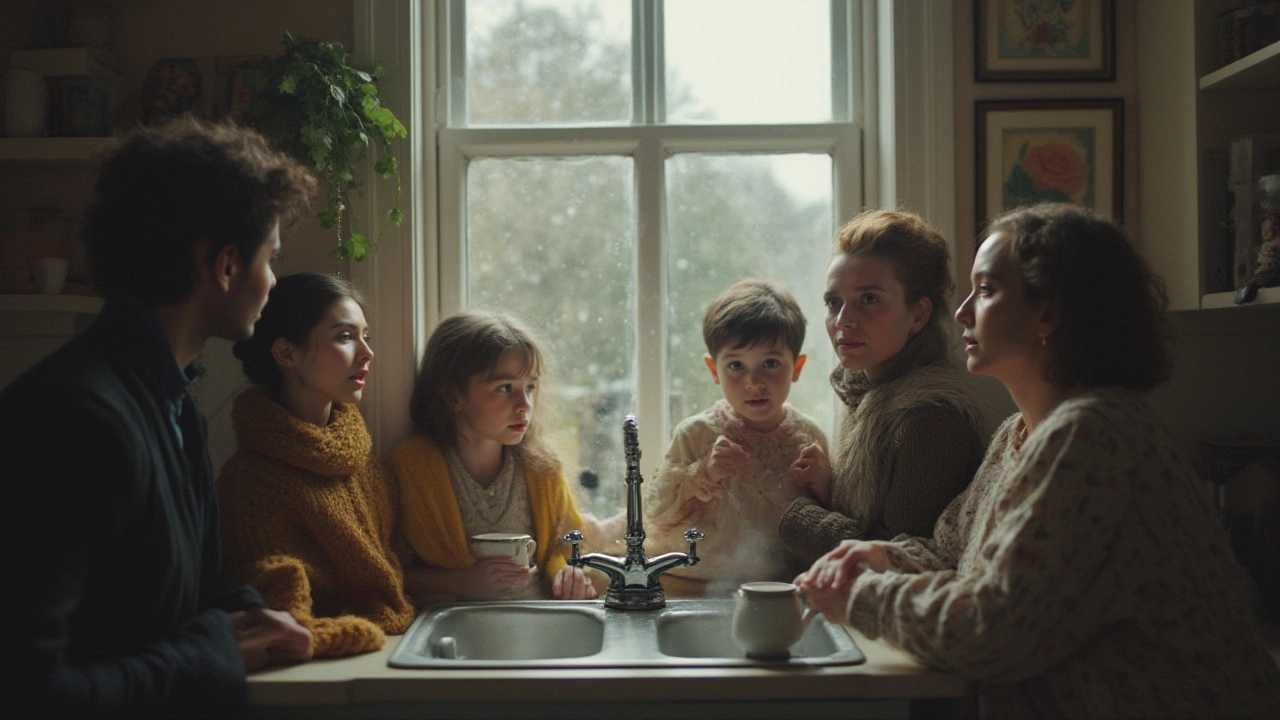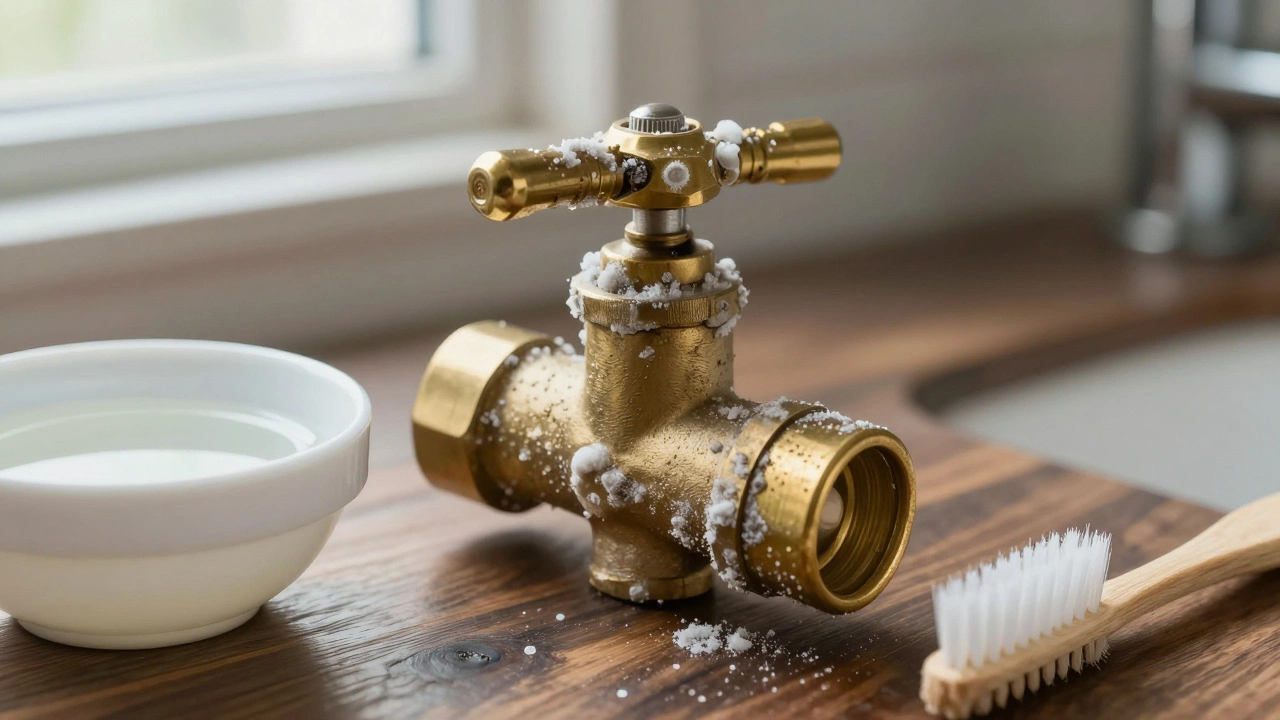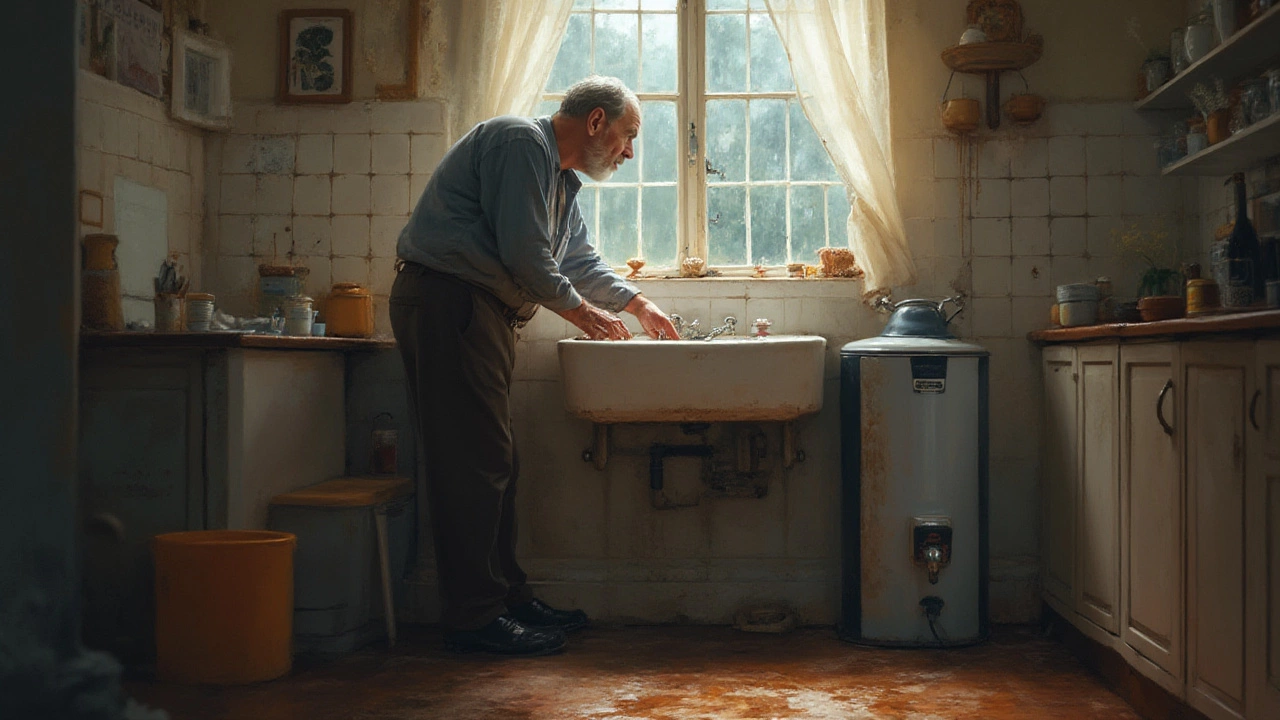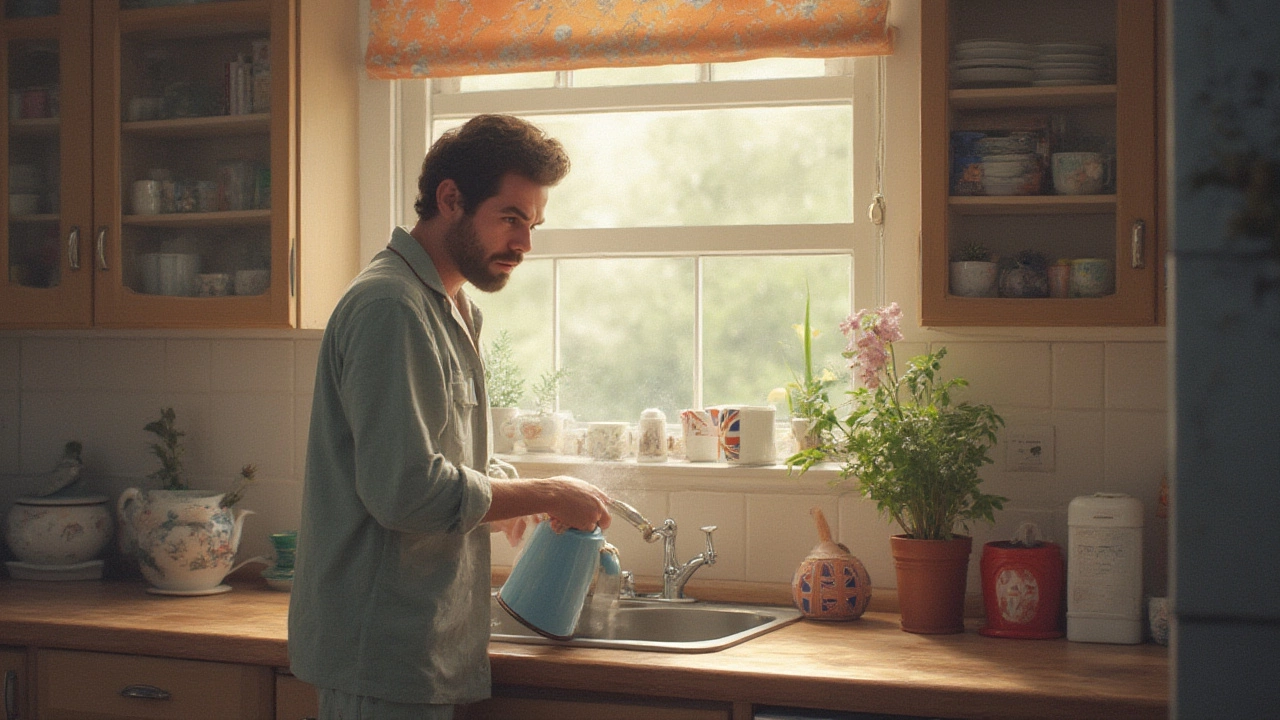
- 30 Jul 2025
- Gideon Thornton
- 0
Picture this: it's pouring rain outside, the kind only Bristol knows how to deliver, and all you want is a good, hot shower to shake off a long day. You step in, twist the handle—and get hit with water as icy as the Avon in December. Few things send a chill through your home quite like your hot water cutting out for no obvious reason. If you've felt that shock, you're in good company. It happens fast, often when you least expect it. But is this just bad luck or the tip of a bigger issue?
What Causes Hot Water to Stop Working Suddenly?
Most people blame their boiler or water heater when the shower runs cold, but dozens of culprits could be hiding behind your problem. Maybe it's the tank, controls, electrical supply, or even the stubborn limescale Bristol loves shedding into pipes. The first step is to figure out what you're dealing with, so let’s break down the likely suspects.
Start with the basics: is it just the hot tap, or are all the water taps stone-cold? If it’s isolated to one, maybe it’s a localised plumbing problem—think blockages, airlocks, or a jammed tap cartridge—rather than your central heating system.
Is your property in an old neighbourhood? Well, congratulations, you probably have pipes older than most people’s grandparents. Ageing copper can collect scale or even spring a leak, causing water pressure drops that knock hot water out of commission. Hard water areas (like good ol’ Bristol) suffer the most here. Scale build-up doesn't just affect kettles, it coats the insides of heating elements in your tank, making them less efficient or eventually causing them to burn out. According to a 2023 study from the Energy Saving Trust, "hard water scale can reduce hot water efficiency by up to 30% in UK homes."
If all taps are cold, then it’s time to look at the main system. Most British homes have either a combi boiler, a conventional boiler with a hot water cylinder, or an electric immersion heater.
With combi boilers, a sudden cut in hot water usually points to the boiler itself: maybe it’s a failed ignition, a safety lockout, or insufficient pressure. Take a look at the control panel on your boiler—flashing lights or weird error codes are the boiler’s way of calling for help.
If you use a timer or smart controller, did someone adjust the schedule by mistake? My wife, Evelyn, once moved our timer while dusting, wiping out our evening hot water slot altogether (she insists it was the cat). Sounds simple, but it happens. Always check the settings before you start panicking.
For houses with a hot water cylinder, the thermostat might fail, turning the tank to an expensive, cold tea urn overnight. Same goes for immersion heaters, where tripped fuses or faulty elements are usual suspects. A surprising number of people discover "dead-spots" in their immersion coil—the electricity is flowing, but the coil isn’t heating.
Let’s talk about gas. Occasionally, gas pressure drops across a whole neighbourhood due to maintenance or weather events. Suddenly, your trusty boiler can’t get enough gas to fire up the water. Ofgem reported a rise in temporary supply interruptions in 2024 during cold snaps, with even short outages causing household boilers to fail until reset.
Power supply can be an overlooked enemy, too. You’d be amazed how often hot water vanishes right after a blown fuse, especially for electric-powered heaters. Got a separate fuse for the immersion heater? Head to the fuse box and see if it needs a reset, but if you spot scorch marks, call a professional—don't try and play hero.
Water supply interruptions hit the headlines in Bristol during the July 2024 pipe burst fiasco. If there’s no water, or pressure drops below a certain threshold, most systems simply won't fire at all. Watch for sudden drops in flow or "sputtering" taps. This usually sorts itself once the mains are back to normal, but persistent problems need a plumber's eye.
With the technical stuff out of the way, don’t forget other rare—but maddening—issues: airlocks in pipes, frozen external pipes on those rare arctic nights, or even software glitches in newer "smart" boilers. Some manufacturers even pushed buggy firmware updates in late 2024, accidentally disabling water heating until a patch arrived!

Diagnosing the Problem: Easy Checks Before Calling a Pro
Now, before your heart rate spikes and you start searching for the most expensive repairman in town, take a breath! Sometimes you can save yourself the headache, the money, and the wait just by doing a few checks yourself. Don’t grab the toolbox just yet—start with your senses and a logical step-by-step approach.
hot water stopped working—but is it really your heating system at fault? Start by checking if you've got cold water at all taps. If you have no water whatsoever, the problem could be from the mains or a water supplier’s issue. Pick up your phone, check if your neighbours are facing the same thing, or look up supply alerts for your street.
- Isolate the issue: If only one place is affected (say, just the bathroom sink), try running the cold and hot taps together for a minute. Airlocks sometimes shift with a pressure boost, and you might get lucky.
- Check the boiler: Head to the boiler and inspect its display. Are there any error codes or blinking lights? The manual (yes, that booklet stashed in the kitchen drawer with takeaway menus) will tell you what the code means. Often it’s as basic as a low-pressure warning (look for 0.6 bar and below on the pressure gauge).
- Resetting is your friend: Combi boiler refusing to play nice? Try resetting it—a simple power off/power on. Sometimes, electronic glitches need a proper restart. But if the same fault code reappears right away, don’t force it repeatedly; that’s your boiler’s way of saying "call for help."
- Thermostat test: For systems with tanks or cylinders, find the thermostat and try nudging it up by a few degrees. Give it 30-60 minutes and then check if the tank is now producing hot water. Still nothing? The thermostat or immersion element might have kicked the bucket.
- The circuit breaker check: Especially with electric heaters, it’s common to trip the breaker during power surges. Flip the relevant fuse and see if the system restarts. No luck? Fuse may have blown or there’s an electrical fault.
- Gas supply: Smell gas or suspect a leak? Time to evacuate and dial the emergency line—seriously, don’t muck about with gas safety. If you see nothing obvious, but the gas meter is dead or certificate is out of date, get your gas provider involved.
- External pipes: Run your hand along visible pipework outside or leading into the loft for frost on a freezing morning. Even in July, a dodgy lagging job or night-time cold snap can freeze things up. Pour warm (not boiling) water over to gently thaw the pipe, and check if hot water returns.
If you find something out of place during these steps—an error message, a ticking pump, a powerless immersion switch—jot it down or snap a photo. Engineers love when you can show them exactly what’s wrong, and it saves time.
But never dismantle gas appliances or live electrical parts. This isn’t DIY territory. As the UK’s Health and Safety Executive warns, "Only competent engineers should attempt to repair or service boilers and gas systems." Boilers are clever, but even the cleverest can’t protect you from a rogue screwdriver.
The role of smart homes can't be ignored. Newer heating systems often tie into Wi-Fi or central smart home hubs. Check your app—sometimes the "hot water schedule" vanished after a clumsy firmware update, or maybe the Wi-Fi cut out. Technology is a blessing, but occasionally leaves you standing in the cold, shouting at your phone like a lunatic.
If after all these checks the answer still eludes you—or water is pouring from somewhere it shouldn’t—get a professional in as soon as possible. Most reputable plumbers and heating engineers in Bristol are trained to handle modern digital controls as well as good old Victorian pipes.
If you notice persistent drops in water temperature, don’t ignore it. As Dr. Suzanne Randle from the Chartered Institute of Plumbing said in a 2024 interview, "Short bursts of lukewarm or fluctuating temperatures are sometimes an early warning of a failing system or hidden leak."
Knowing what steps you’ve already taken not only saves you cash, it helps the pro get straight to the problem when they arrive. Time is money, especially when half the city seems to have boiler issues in the same week.
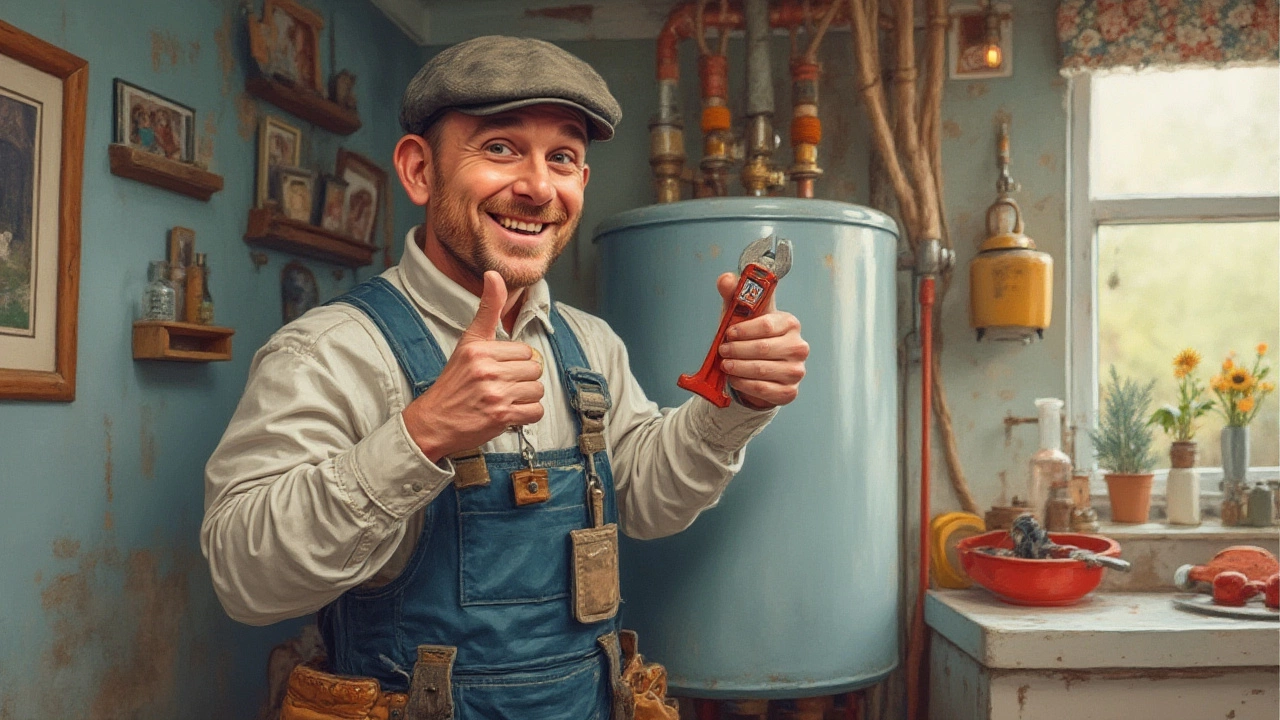
Prevention and When to Call a Professional
The best way to avoid cold showers or failed morning routines is to give your hot water system some routine care. It isn’t glamorous but is miles cheaper than emergency callouts and ruined towels.
The single most important tip? Annual servicing. Having your boiler or water heater checked every year by a certified engineer doesn’t just save on breakdowns. It keeps your warranty valid and helps the system run at peak efficiency, slashing bills and carbon emissions. According to Which?, "A poorly maintained boiler can add £200 a year to your energy bills." Put the check-up in your calendar—maybe aim for early autumn before colder months hit.
Limescale is an even sneakier enemy than you’d think. In Bristol, where water is famously hard, descaling your system or fitting a water softener pays off. Descalers aren’t as expensive as they used to be, and installation is often a one-day job. Regularly clear showerheads and tap aerators too. If you see white crusty bits or flakes, you’re overdue for a clean.
Don’t overlook pipe insulation, either. Some of the most spectacular hot water fails come from pipes freezing or sweating in awkward out-of-sight places. Foam insulation sleeves are cheap and a weekend job, saving you a fortune if cold weather does hit hard. Even a single frozen pipe can cause a domino effect, shutting the whole hot water system down.
Smart thermostats with alerts for "abnormal temperatures" are worth considering if you’ve already invested in a smart home. Some models send you a notification if the tank isn’t heating properly or if it spots a daily pattern change. While you shouldn’t rely only on tech, it gives you a head start on problems.
Pairing all that with basic know-how—like knowing where your stopcock and shut-off valves are—makes you the kind of prepared homeowner plumbers enjoy visiting. They know you won’t be the one who waited until the kitchen was three inches underwater before acting!
Still, know your limits. There’s a difference between a cautious check and reckless DIY. If you’re ever faced with any of these:
- Smelling gas or seeing signs of a leak
- Water flowing from places it shouldn’t
- Scorch marks, burnt smells, or buzzing from an appliance
- Error codes you can’t identify or reset
Stop and call in the pros. The peace of mind alone is worth every pound. Plus, a botched repair can void insurance or put your family at risk.
If you think breakdowns only hit "old" systems, think again. Modern boilers and water heaters fail, too. Complex circuitry, sensors, or condensation drainage pipes can go wrong at any age—sometimes just months out of the box. If you’ve recently had major building or electrical work, check for "accidental isolation"—some tradespeople turn off heaters at the spur for safety and forget to turn them back.
The main lesson? If your hot water stops working out of the blue, something’s up. Whether it’s dodgy pipework under Victorian floorboards, a clumsy firmware update, or the relics of Bristol’s latest water main drama, arm yourself with checks and stay calm. Next time the hot tap runs cold, you’ll know where to look before you even think about picking up the phone.


